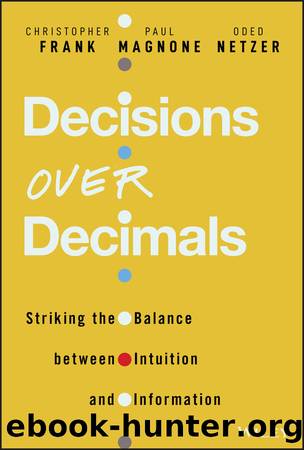Striking the Balance between Intuition and Information by Paul Magnone & Oded Netzer

Author:Paul Magnone & Oded Netzer [Magnone, Paul & Netzer, Oded]
Language: eng
Format: epub
Published: 2022-10-04T00:00:00+00:00
The Lack of Synthesis
Unfortunately, we suspect that despite our wish to have our colleagues and people who work for us deliver information in a way similar to the previous administrative assistant Sam's scenario 2, many of us see communication similar to scenario 1 much more often. Why is that? If it is clear that synthesis is the desired outcome from the point of view of the receiver, why do those who deliver information often summarize? There are several reasons for this, including the effort required to synthesize, the risk involved in it, and the human desire to demonstrate how hard we worked.
First, relative to a synthesis, a summary is easy. All it takes to summarize is to look through the data and methodically report it piece by piece, as Sam did in scenario 1. A summary is often the first step in the process of synthesis. Synthesis requires the extra step of looking across the data points and asking the difficult question of what it really means. Further, in communicating the synthesis, one needs to decide which pieces of the information from the summary communicate the key message. Thus, while the communication of synthesis is often shorter, as Sam's email in scenario 2 demonstrates, do not confuse that with the ease of writing it. This is a classic example of the famous quote, âIf I had more time, I would have written a shorter letter,â which in one form or another has been attributed to multiple thinkers including Marcus Tullius Cicero, Blaise Pascal, and Mark Twain. Writing the shorter synthesis of the information and thinking carefully about which ingredients should go into the synthesis require both time and effort.
Second, a synthesis is riskier than a summary. A summary of the information is almost always factual. As long as the underlying information is correct, the summary of it is likely to be true. On the other hand, synthesis requires pouring in some judgment, and judgment, by definition, includes a good deal of uncertainty. For example, when synthesizing, our administrative assistant Sam decided to schedule the meeting at 11:00 a.m. However, there is a chance that Sam's boss forgot to update her calendar and is not available at 11:00 a.m. The alternative scenario of asking âWhat do you think?â is a safer approach.
The mistake may not be a big risk in the case of scheduling a meeting, but in different contexts, such wrong judgment can be costly. For example, synthesis can be a matter of life and death in hospital settings. The process of looking at data such as vitals and test results and combining it with the patientâs background and the physicianâs medical acumen to arrive at a diagnosis, is the process of synthesis. Residents who are training to become physicians need to learn how to make such syntheses. In emergency rooms (ERs), it is often a medical student or a junior medical resident who is admitting the patient, taking vitals, and doing the tests and then reporting to the attending physician.
Download
This site does not store any files on its server. We only index and link to content provided by other sites. Please contact the content providers to delete copyright contents if any and email us, we'll remove relevant links or contents immediately.
| Bookkeeping | Business Mathematics |
| Business Writing | Communications |
| Decision Making | Negotiating |
| Project Management | Running Meetings & Presentations |
| Secretarial Aids & Training | Time Management |
| Training |
Nudge - Improving Decisions about Health, Wealth, and Happiness by Thaler Sunstein(7711)
Deep Work by Cal Newport(7089)
Principles: Life and Work by Ray Dalio(6457)
The Doodle Revolution by Sunni Brown(4769)
Factfulness: Ten Reasons We're Wrong About the World – and Why Things Are Better Than You Think by Hans Rosling(4745)
Eat That Frog! by Brian Tracy(4543)
Thinking in Bets by Annie Duke(4229)
Hyperfocus by Chris Bailey(4123)
Visual Intelligence by Amy E. Herman(3787)
Writing Your Dissertation in Fifteen Minutes a Day by Joan Bolker(3731)
Ogilvy on Advertising by David Ogilvy(3625)
Hidden Persuasion: 33 psychological influence techniques in advertising by Marc Andrews & Matthijs van Leeuwen & Rick van Baaren(3569)
How to Win Friends and Influence People in the Digital Age by Dale Carnegie & Associates(3566)
How to win friends and influence people by Dale Carnegie(3478)
The Pixar Touch by David A. Price(3442)
Schaum's Quick Guide to Writing Great Short Stories by Margaret Lucke(3383)
Deep Work: Rules for Focused Success in a Distracted World by Cal Newport(3238)
Work Clean by Dan Charnas(3125)
The Slow Fix: Solve Problems, Work Smarter, and Live Better In a World Addicted to Speed by Carl Honore(3012)
